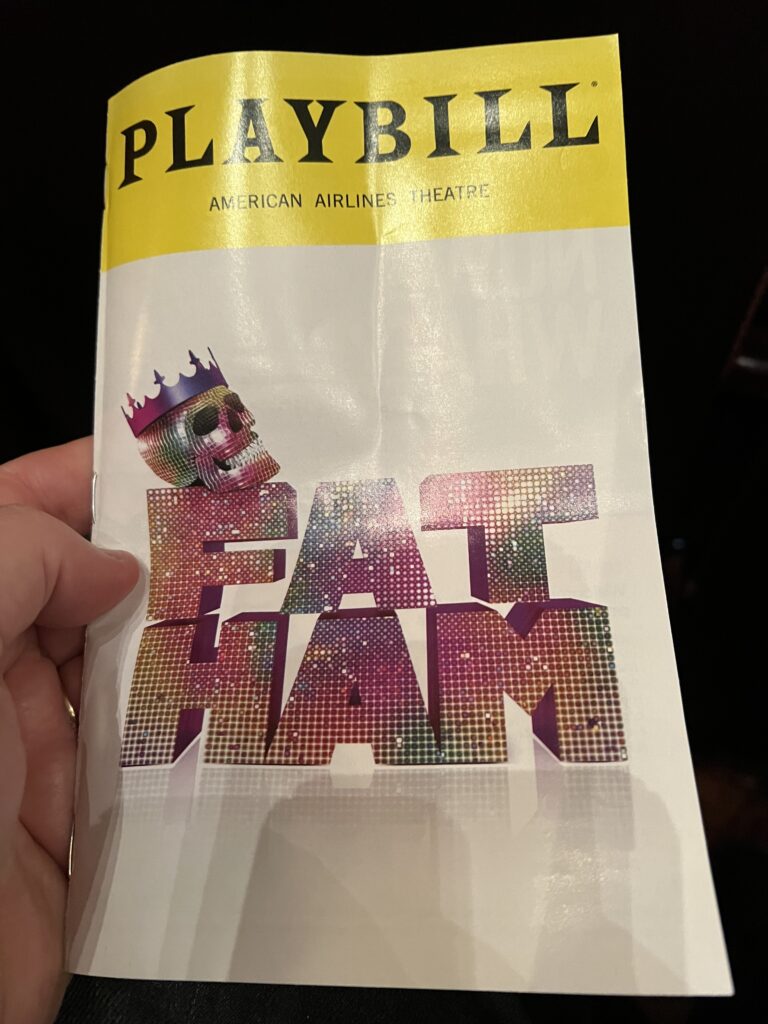I saw this sweet, spicy, tangy BBQ reimagination of Hamlet last spring, when it had its first live run at the Public Theater. Like Jesse Green in the New York Times, I love the way James Ijames’s play finds a way through the English language’s most famous tragedy into comic renewal and joyful exuberance. Fat Ham tells a funny and powerfully moving story of surviving the hostile world into which today’s younger generation has been thrown.

It was very much the same production, with the same cast, set, and mostly the same staging, so while it was great to see the play gets its mid-town moment, I find myself thinking many of the same things about it now that I wrote up last June. It’s a profound and hilarious take on tragic necessity: “Why not live, instead?” It was fun, this time around, to see Chris Herbie Holland play Tio (Horatio), the stoner buddy whose video game erotic fantasia leads the cast away from bloodshed at the play’s end. (When I saw it last year, understudy Marquis D. Gibson played the role – and he was brilliant! But it was fun to see Holland this time.)
Seeing the play the night before Shakespeare’s birthday / deathday, I thought even more than usual about how Big Will works as both enabler and obstacle for contemporary playwrights like Ijames. On the one hand, the suffocating tragic structure of Hamlet represents the thing Juicy, and perhaps also his author, must overcome. On the other, there’s plenty of Ham still on this bone, and Marcel Spears delivers powerful renditions of the speech about “catching the conscience of the king” – or, as he explained, “actually I mean the cook – it’s a different play.” He soared in declaiming, “what a piece of work is a man.” The play opts out of the canon’s tragic grip in the end, in favor of queerness, disco, and flamboyance – but to an extent Shakespeare was already there.
The other thing I thought a bit differently about this time was Nikki Crawford’s brilliant performance as Tedra (Gertrude). Her closeness with her son is another intertextual joke, as when Juicy changes out of his “inky claok” and instead puts on the “Mama’s Boy” sweatshirt she got for him. But since Tedra, like all the other characters in the play with one hog-butchering exception, doesn’t die in the end, she’s faced with burying a second husband not long after losing the first. Fat Ham makes explicit what Hamlet left likely but unsaid – that the dead father was a bad, violent man. (John Updike’s novel Gertrude and Claudius elaborated this reading in 2000.) So when Rev (Claudius) chokes to death on his own BBQ’d rib (!), Tedra becomes bereft a second time. But she, like Juicy and the queer kids of the next generation, finds a way to go on. She and Juicy together pull a red gingham tablecloth over Rev’s body, laying him to rest. That same sheet had been covered the afternoon BBQ, and it also served as the costume for Pap’s ghost back at the start of the play. It’s red color is the blood of violence, of BBQ, and even of the murdered who dies from his own BBQ. Tedra didn’t have much to say at the end of the play, but like Rabby (Polonius) she stayed the course. The first time I saw the play I focused on Juicy, Opal, Tio, and Larry as the survivors. This time, I thought also about Tedra and Rabby, the women who outlasted their generation of violent men.
What does it take to survive tragedy? That’s a question for the 2020s, as of course it was for Shakespeare in the 1600s when he wrote Hamlet. It’s an environmental question, though Fat Ham seems mostly engaged with the toxic legacies of racism, masculine violence, and homophobia. It’s not as much of an eco-play as it could be – though perhaps Rev’s insistence on spending Juicy’s tuition money on a new bathroom gestures toward modern consumerism and its attendant costs.

Fat Ham makes a sweet and juicy meal, with much to think about and much to enjoy. At the American Airlines Theater on 42nd Street through June 25th!